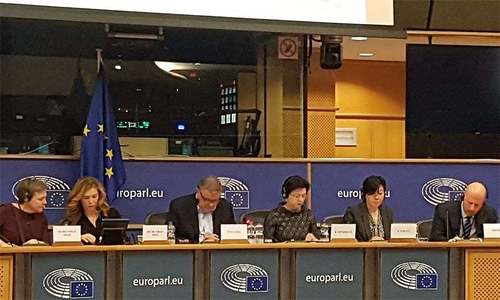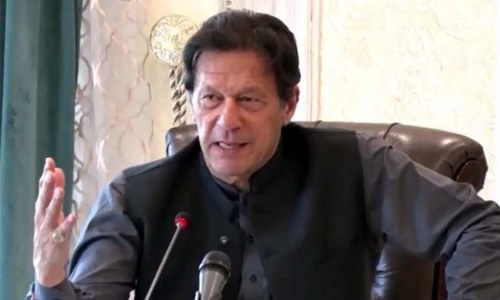IN an unprecedented move last week, the European Parliament took Pakistan to task over human rights violations, growing religious intolerance and shrinking freedom of expression in the country. A resolution was adopted which called for an immediate review of Pakistan’s eligibility for GSP-Plus status. The withdrawal of the concession could deal a serious blow to our exports to the European Union.
It may not be the first time that questions have been raised about our dismal human rights record by the international community, but the latest EU parliamentary resolution is much more damning and consequential. The criticism not only reflects our failure to counter rising religious intolerance and bigotry, but also exposes a diplomatic debacle.
It is shocking that the foreign ministry could not see it coming and the resolution caught the government by surprise. The anti-France protests by the religiously motivated TLP and the resolution presented by the government in parliament on the question of whether or not to expel the French ambassador — as per the demand of the group — seems to have been the trigger for such a strong response by the EU Parliament.
Editorial: It should not take a threat from the EU for Pakistan to see how the blasphemy law is being misused
Indeed, some other factors too contributed to this toughened stance by the members of the European community. The increasing number of incidents of misuse of the blasphemy law, particularly targeting members of minority religious groups, has long drawn criticism at home and abroad. Some latest cases have raised further concerns. Diminishing democratic freedoms in the country has also been a cause of worry.
It was shocking to see the complete diplomatic paralysis as the resolution was moved in the EU Parliament.
Unfortunately, successive governments here have failed to address these concerns. But the present government with its tendency to encourage religiosity has added fuel to extremism. Its virtual surrender last November to an extremist group and its apparent acceptance of all its demands including the expulsion of the French ambassador has come back to haunt the PTI government.
The government has belatedly announced that it would address EU concerns. But it’s not clear whether it has any strategy to deal with the issues raised in the resolution. It’s not just a matter of satisfying the international community; it is in the country’s own interest to fight extremism and curb human rights violations.
Unfortunately, we only wake up to these challenges when there is external pressure. Should we have waited for the EU resolution to initiate steps that the cabinet has reportedly decided to take in order to address issues related to human rights and freedom of expression?
The overwhelming support for the resolution by members of all major European nations also raises questions about our foreign policy imperatives. Like its failure on the domestic front, the PTI government has not much to show for its performance on the external policy front.
It was shocking to see the complete diplomatic paralysis as the damning resolution was moved in the EU Parliament. Was there any effort made to explain our position to its members? In fact, relations with Europe have never been a priority for the current government.
Support for the resolution reflects the cavalier way in which we conduct our diplomacy with one of the world’s most important economic blocs. Europe is vital to us not only because it is our largest trading partner but also because of its position in global politics. In terms of foreign policy, after Brexit, there was a need to develop better relations with France and Germany, the two most powerful European countries.
The prime minister continues to claim that no one knows the West the way he does. But does he really have any grasp of the existing political dynamics in Europe? Being familiar with British high society is one thing and understanding politics and values in the West quite another.
His interaction with major European countries during his two and half years in office has been nominal. Therefore, it is not surprising to see the same kind of confusion on foreign policy as the disaster witnessed on various domestic policy fronts. The prime minister’s comments on domestic policy decisions in some European countries have not helped improve our ties. The latest parliamentary resolution is also a manifestation of our failure to give due importance to our relationship with Europe.
One more reason for the drift is that we have what is often described as a part-time foreign minister whose major interest is in domestic politics. Apart from his recent visit to Germany, it is difficult to recall any other trip he has made to a Western capital as foreign minister in the present government. His interactions with his European counterparts are mostly by telephone.
One is not sure if the latest diplomatic setback will jolt our foreign ministry out of its slumber. There has been a gradual regression in the quality of leadership in the department. The collapse is apparent all over. It’s not just the handling of Europe, the situation is not very encouraging when it comes to other regions either.
It’s hard to guess who is in charge of our foreign policy. While the defence establishment is apparently in command of policies related to Afghanistan, India, China and the US, there is a huge gap when dealing with other countries. There is certainly no understanding of the evolving geopolitics.
Foreign policy begins at home. It is largely political and economic stability that determine our foreign policy direction. The prevalent political instability, growing faith-based extremism, intolerance and shrinking democratic space all have a serious impact on our foreign relations. Our weak economy and the absence of effective governance have further eroded our capacity to build relationships with other countries as equals.
Most worrying is the illusion of our current leadership that we are playing a global role when there is little understanding of the dynamics of global and regional geopolitics. We could do much better on the external front if our leadership focused on the problems that have put Pakistan in such a humiliating situation. Who can treat us as a responsible country when certain ministers have been perceived as inciting people to kill?
The writer is the author of No-Win War — The Paradox of US-Pakistan Relations in Afghanistan’s Shadow.
Twitter: @hidhussain
Published in Dawn, May 5th, 2021














































